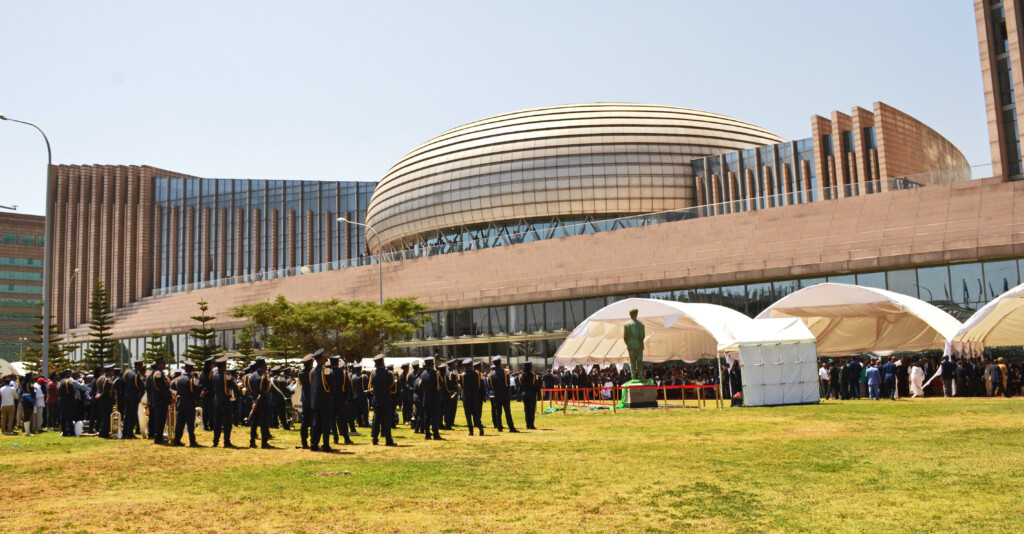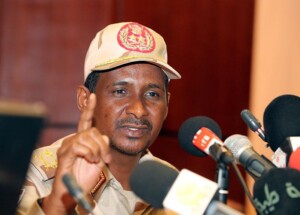Summits ‘seek aim to end war in Sudan’

Afrian Union headquarters in Addis Ababa (File photo: AU)
ADDIS ABABA / CAIRO –
A summit is being held today in the Ethiopian capital Addis Ababa, with wide international participation, to discuss the Intergovernmental Authority on Development’s (IGAD) roadmap to end the war in Sudan. Another summit of regional leaders will be held in Egyptian capital Cairo on Thursday, hoping to de-escalate hostilities.
A source within the African Union (AU) told Radio Dabanga that the meeting today will also discuss humanitarian issues and the possibility of delivering aid to those affected, as fighting between rival military forces has led to the displacement of nearly three million people since mid-April.
The meeting in Ethiopia is hosting foreign ministers of the IGAD Quartet for Sudan, which includes Kenya, Djibouti, South Sudan, and Ethiopia, as well as representatives of the United Nations (UN) and the USA.
US Assistant Secretary of State for African Affairs Molly Phee, UN Undersecretary for Humanitarian Affairs and Emergency Relief Coordinator Martin Griffiths, and a number of UN agencies, international organisations concerned with humanitarian aid, the European Union and envoys of European and American countries will participate too.
On Saturday, Abiy Ahmed, the Ethiopian Prime Minister already received a delegation of Sudanese civilian political forces headed by Maj Gen (Retd) Fadlallah Burma, interim head of the National Umma Party.
The spokesperson for the mainstream Forces for Freedom and Change (FFC-Central Council), Khaled Omar Yousef, reported on social media that a delegation of Sudanese politicians arrived in Addis Ababa today to further discuss ways to stop the war.
“We arrived with a number of Sudanese civilian actors in the Ethiopian capital which is witnessing important activities aimed at stopping the war in Sudan. During this visit, we are working to communicate with Sudanese, regional and international actors in order to accelerate efforts to bring peace to our country.
“This war must stop, and we will spare no effort to contribute effectively to this end as soon as possible.”
Wajdi Saleh, a prominent lawyer and leading member of the Arab Socialist Ba’ath Party that withdrew from the FFC-CC in December, said in a post on his Facebook page that a broad and united civil and political front is the only effective tool to stop the war, achieve peace and put the country on the path of a state of citizenship and democracy.
Cairo summit
On Thursday, Egypt will host a summit of Sudan’s neighbouring countries to discuss the situation in Sudan and the possibility of stopping the fighting between the army and the Rapid Support Forces.
Egypt’s President Abdelfattah El Sisi has invited South Sudan’s President Salva Kiir Mayardit, Chad’s President Mahamat Idris Deby, chair of the Libyan Presidential Council, Mohamed El Menfi, Central African Republic President Faustin-Archange Touadéra, Ethiopian Prime Minister Abiy Ahmed, and Eritrean President Isaias Afwerki, a source confirmed from Cairo.
African Union
Sudan’s acting Foreign Affairs Minister Ali El Sadig said in a statement on Sunday that the Sudanese government support the principle of “African solutions to African problems”.
He pointed out that Sudan’s membership in the African Union is still frozen, and that it is thus difficult to accept any initiative that is not consulted with the Sudanese government.
As for Sudan’s decision to declare Special Representative of the Secretary-General and Head of the United Nations Integrated Transition Assistance Mission in Sudan (UNITAMS), Volker Perthes, persona non grata last month, the acting FA minister said that Perthes was appointed, with the approval of the government of Sudan, as head of the UN mission tasked with assisting Sudan in the democratic transition process.
“UNITAMS has eight basic tasks, but Perthes focused on the political processes only, and ignored the other tasks,” he said.
“The former UN envoy to Sudan [Perthes] had a direct role in complicating the political process through his work with certain political parties and groups while excluding other political groups. So, the Sudanese government saw that his continuation in his mission would further complicate the political scene. The Secretary-General of the United Nations was requested to replace him. When this did not happen, we finally declared him persona non grata.”
The minister stressed Sudan’s adherence to the tasks of UNITAMS.











 and then
and then